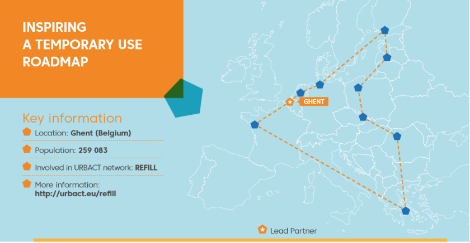Ghent (BE) - Inspiring a temporary use roadmap
2019
As REFILL Lead Partner, Ghent drew on its experiences and collaborated with partner cities to develop transferable tools for the temporary activation of vacant city spaces.
To download : urbact-citystories-ghent.pdf (1.9 MiB)

Grassroots Ghent
Picturesque Ghent has a rich history — a former centre of the textile industry, it was one of the largest and wealthiest northern European cities in the Middle Ages. In recent decades, however, the city has drawn new attention as a pioneer of innovative, community-centred urbanism. In the 1990s, Ghent established ‘neighbourhood managers’ — civil servants who connect with citizens, their initiatives and new ideas. In 2007, the city started experimenting with temporary use of vacant spaces, creating ‘De Site’ on a former factory site, with community allotments, sports facilities and an urban farmstead. This inspired similar projects across the city. Neighbourhood managers now act as brokers for temporary use initiatives, engaging citizens and signalling opportunities. In 2014, the city established a Temporary Use Fund to incentivise initiatives that contribute to urban liveability.Because of this wealth of experience — matched with the desire to formalise such activity, evaluate best practice and collaborate internationally — Ghent became Lead Partner for the URBACT REFILL network.
Speed dating for projects
REFILL set out to pool expertise and develop best practice tools for temporary use. One of them was the matchmaking tool, developed and piloted in the REFILL network and tested in Poznań (PL), Cluj-Napoca (RO) and Ghent. This is a pitch-centred “speed dating” event connecting city governments and local initiatives in a productive, structured way to develop opportunities for temporary use. Ghent was looking for ideas and coordinators to activate the city’s old library building temporarily before its redevelopment, kick-starting a new dynamic in the city centre. Ghent set up an URBACT Local Group bringing together 42 stakeholders from municipal services, start-ups, community organisations and urban planners to define actions. In early 2017, the city organised the Bibmarkt match-making event, gathering 147 speakers to pitch their idea for the temporary use in the library. Initiatives that did not win the bid have since found other matches and projects, proving the multifaceted benefit of the process.A consortium led by local non-profit Timelab won the library bid, and in May 2017, the building reopened as NEST (New Established State of Temporality), a space for making, networking, collaboration and experimentation. During twelve months, NEST hosted over 30 bottom-up, community-focused initiatives. The project — including a cafe, event and co-working spaces, workshops and a creative studio — became a laboratory for the city’s future. “It was a huge challenge,” admits City of Ghent Policy Participation Officer and REFILL Local Coordinator Emma Tytgadt, “but a huge success, and this is because of the group of stakeholders [URBACT Local Group] that was already formed.” Ghent also improved communication and promotion of temporary use projects – which are shown in a digital map on the City of Ghent website. A university study provided a framework for assessing the impacts of temporary use, which the city now hopes to implement. And what started as the REFILL local group will continue as a temporary use learning network, backed by the city’s Policy Participation Service, of which the neighbourhood managers are part.